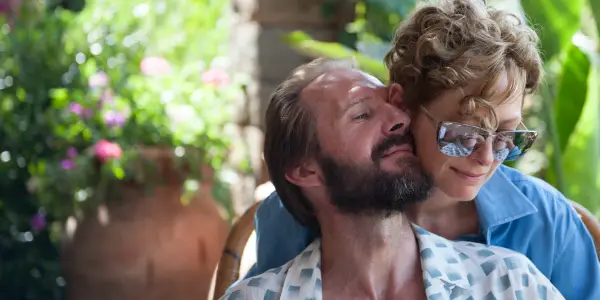A BIGGER SPLASH: Trouble in Paradise

Becky spends her days working in TV and she spends…
A remake of the 1969 Italian-French film La Piscine and partly inspired by David Hockney’s ‘Swimming Pool’ painting, A Bigger Splash is the fourth feature film from Luca Guadagnino, and has already made significant waves with critics and audiences alike (sorry for the absolutely appropriate pun).
Starring Tilda Swinton as rockstar Marianne recovering from throat surgery, and Matthias Schoenaerts as her ever-loving albeit boring boyfriend Paul, the two of them aim to escape life to an idyllic Italian island in the middle of the Mediterranean. No phones, no work, no interruptions. Cue Ralph Fiennes (Harry), Marianne’s ex-lover and manager, arriving unannounced with a beautiful young lady (Dakota Johnson) on his arm. It’s not his latest squeeze (although you’d be forgiven for thinking so), it’s actually his daughter from a distant relationship.
Amidst heated conversations and illicit attractions, the four of them embark on a summer they will all remember – maybe not for the right reasons. As the temptation presents itself, A Bigger Splash reveals the worst of each of them. Admittedly, it isn’t always enjoyable to watch four beautiful people languishing in the beautiful sun, eating delicious food and destroying each others’ lives, but for some reason this film manages to toe the line of interesting and provocative, rather than dipping into self-indulgent narcissism.
The Garden of Eden
Initially in A Bigger Splash, there are clear influences from Italian New Wave cinema of the 1960s; the film weaves in and out of various styles, drawing inspiration from a number of other films and eras of cinema. Michelangelo Antonioni (particularly L’Avventura) is a clear inspiration for A Bigger Splash; the narrative of the things left unsaid and the physical setting of a rural Italian island ensure that the film feels like it could be a part of that repertoire of cinema.
Dakota Johnson’s character Penelope is unmistakably drawn from Lolita – the sexualised young girl who rocks the status quo by simply existing. Yet, there are elements of Hitchc*ck embedded within the film as well. The seemingly endless driving is reminiscent of Vertigo, complete with the spiraling soundtrack when things begin to unravel. The last third of the film particularly feels as if it could have been ripped straight out of a Hitchc*ckian mystery thriller, as the tension and pacing accelerate dramatically.

Despite the mix of genres, influences and styles – A Bigger Splash feels accomplished within this and determined to colour outside of the lines in terms of conventional filmmaking. It isn’t afraid to mix big, dramatic scores with incredibly action-less scenes, resulting in a sense of slight confusion but a desire to know more. This desire is well-fuelled, because very little actually takes place in A Bigger Splash. The story is meandering, in no rush to reach the end and giving away no indication as to where the narrative will end up. For the majority of the film, we are simply treated to the spectacle of watching four people destroy each other.
The almost silent role of Marianne is spectacularly performed by Tilda Swinton, to the point that the film may not have worked at all if Swinton hadn’t played the character. She utters perhaps five or six lines throughout the whole film, but her strength is being able to convey the character’s emotions and thoughts without the need to vocalise. In contrast, Ralph Fiennes as loudmouth Harry is equally as riveting in an entirely different way. Interestingly, the decision to make Marianne silent was Swinton’s choice – an aspect which completely alters the relationship between her and Harry. Whilst she is silent, Harry doesn’t stop talking, with his endless chatter infiltrating the peace that Marianne and Paul sought to have.
I, for one, was very happy to see Dakota Johnson in a more challenging role post-50 Shades. Though Pen’s main character arc is that of a seductress, there are glimpses throughout of her true thoughts and feelings. The conversation Pen and Marianne have by the pool where Pen basically rebuffs Marianne for being old and irrelevant (with some clever dialogue about vinyl records), shows that Pen’s intentions and desires go much deeper than they appear at surface level. The presence of Pen within the film serves to remind the other three characters of their own age, and fears about being ‘past it’. Marianne, of course, is already confronting this fear, as the possibility of never being able to sing again is dangling right in front of her.
“Europe’s A Grave”
There are moments in A Bigger Splash that lose me slightly, mostly due to the recurrence of lengthy monotonous scenes. Whilst most of it is captivating, it begins to become slightly tedious. There is a cyclical nature to the film, and watching the same action play out over and over again does start to feel a little repetitive. Most of the action lies in the unsaid words that cling to the side of the beloved swimming pool or the decadent outdoor dining table, which is interesting to begin with but becomes frustrating when it occurs for the fifth or sixth time. It is also unclear where the film is going and what the end result will be. This can be enjoyable, as Guadagnino clearly wants us to sit back and absorb what is onscreen, but a few times it felt more confused than a stylistic choice.
The second-act twist comes almost too late, but succeeds in reeling the audience back into a film which now feels less like a lusty Italian New Wave film and more like a crime thriller. New concepts are thrown into the mix and it changes pace dramatically. The two halves feel like radically different films (halves used lightly, it’s more like 3/4 of the way into the film), which I think A Bigger Splash benefits enormously from. It breaks with the convention of simply letting the film play out, as this event actively forces the audience to engage. Are they all bad people? Can we really identify with any of them? Although the last twenty minutes are probably needed, it does feel as if the film goes on for a little too long wrapping everything up nicely, whereas it may have been more satisfying to simply not know how everything plays out and ask these questions to ourselves.

There is also a questionable edge to the refugee subplot in the film, which is hinted at throughout but used in full force at the end. Is this passing a comment on the dehumanisation and vilification of those caught up in the migrant crisis? Or is it using refugees as a clever way out of a tricky plot twist and mirroring the very real migrant-blaming culture that has erupted within Europe in recent years? It’s true that the only refugees we see are the four men that Pen and Paul stumble across on their hike, and the film positively revels in framing them as scary migrants.
On the other hand, Guadagnino is quite possibly remarking on the privilege and hedonistic lifestyle of our four main characters – they have no worries but the swimming pool when a whole different world exists on the other side of the Mediterranean. They do, of course, choose to swim in the pool rather than the sea – is Guadagnino asking us to examine the ignorance of the white, middle class who ignore the things they don’t want to think about? It’s probably a stretch too far, but it is food for thought.
Final thoughts…
A film for film-lovers and filmmakers alike, A Bigger Splash leaves us with little hope for the world or the relationships we form with those in our lives. It’s a lazy, meandering journey which takes its time getting there, but when it arrives it feels worth it. The cast really pull the film together and allow us to enjoy watching their often comedic destructive nature and inability to behave like adults. It goes deeper than that, but on a basic level isn’t that what it is all about?
What did you think of A Bigger Splash? Is it a homage to Italian New Wave Cinema or a film about privileged people on holiday? Let us know in the comments!
A Bigger Splash is out now in selected UK Cinemas, and will be released in the USA on May 13th 2016. All international release dates can be found here.
Does content like this matter to you?
Become a Member and support film journalism. Unlock access to all of Film Inquiry`s great articles. Join a community of like-minded readers who are passionate about cinema - get access to our private members Network, give back to independent filmmakers, and more.
Becky spends her days working in TV and she spends every other minute writing about cinema, TV & feminism. Based in London, she also likes drinking gin, re-watching 'The X Files' and writing about on-screen representation and all manner of things over at femphile.com













